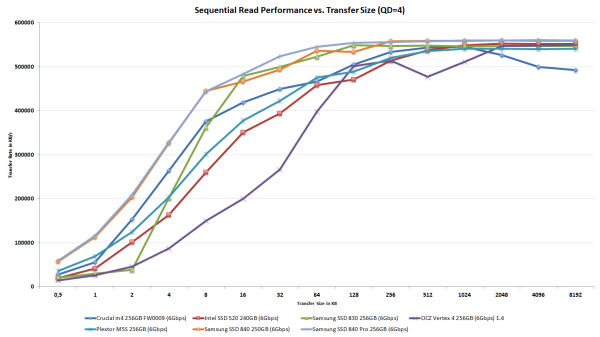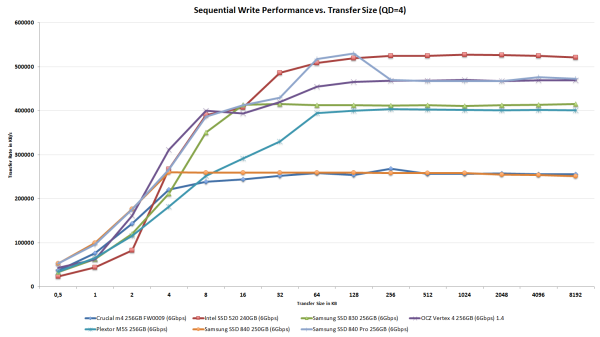Samsung SSD 840 (250GB) Review
by Kristian Vättö on October 8, 2012 12:14 PM EST- Posted in
- Storage
- SSDs
- Samsung
- TLC
- Samsung SSD 840
Performance vs. Transfer Size
ATTO is a useful tool for quickly measuring the impact of transfer size on performance. Similarly to the 840 Pro, the 840 is a high performer at small transfer sizes, which is an area I think too many SSD vendors are ignoring. Not all IOs are huge in size and while the small IO read/write speeds aren't big enough to be used for marketing, they play a role in real world performance. In write speed the 840 tops out at 250MB/s, which is low compared to many other SSDs but otherwise the 840 performs very well.
Click for full size












86 Comments
View All Comments
JarredWalton - Monday, October 8, 2012 - link
What price are you looking at? The table shows $199.99 for the 250GB Samsung 840 (MSRP) and $249.99 for the 256GB Samsung 840 Pro.Kevin G - Monday, October 8, 2012 - link
On the fourth page:"With perfect wear-leveling and write amplification of 1x, you would get 256TiB of writes out of a 250GB Samsung 840 with TLC NAND and 1,000 P/E cycles. "
Shouldn't it be 256 GiB?
JarredWalton - Monday, October 8, 2012 - link
No; he's accounting for the visible storage capacity (and spare area). So 250GB is 256GiB of NAND but only 250GB end-user storage. You can still write 256TiB of data (256GiB * 1000 P/E), which means on a 250GB SSD you end up with the ability to write 281TB of data (for an effective P/E cycles of 1125).schizoide - Monday, October 8, 2012 - link
I'm not comfortable with TLC, particularly since it doesn't come at a huge absolute cost savings. I've been burned too often with SSDs, and now only buy the most bulletproof devices available. Maybe next generation. Maybe.Death666Angel - Tuesday, October 9, 2012 - link
I wouldn't draw any conclusion for pricing just yet. Everyone is comparing street prices of current gen SSDs to MSRP of next gen SSDs. Give it a few months to get the 840 into stores and selling and then we'll se how prices fair.I'm personally fairly confident that there will be a distinct cost advantage.
name99 - Tuesday, October 9, 2012 - link
Have ANY SSDs given you a failure based on the flash cells themselves, rather than on crappy firmware?It's stupid to demonize a technology because some companies sold you a bad product --- especially when your response is to refuse to buy a product from a company that is known (in this respect at least) NOT to have shipped crappy firmware.
harijan - Monday, October 8, 2012 - link
Pretty sure 3650GiB != 3.65TiB.3650GB == 3.65TB.
It doesn't do anything to your percentages, but this is Anandtech, we hold you to higher standards ;)
Kristian Vättö - Tuesday, October 9, 2012 - link
You are correct, I forgot that binary units don't scale up linearly (1000GiB is not 1TiB); metrics are just so much simpler. Thanks for the heads up, I've fixed the math now.iaco - Monday, October 8, 2012 - link
I wonder if Samsung will ever make a SSD made of SLC NAND. The performance would be amazing.Conficio - Monday, October 8, 2012 - link
First thanks to the Kristan and the Anand Team for another comprehensive review and the inclusion of in depth knowledge about the technology behind it.I'd like to see included in the test (or in another article) a review of the available tools for each SSD. I think it is important to know if the manufacturer supports its tools to low level format, secure erase, TRIM, ROM update etc. beyond the obligatory Windows (7). Are those available for Linux (command line and/or GUI)? Are they available for Mac OSX? Do they work if the drive is connected over USB? Are these tools user friendly to use?
It is useless if I buy an SSD and have to find out that Mac OSX does not support the tools. I have a couple of Vertex drives which I can't find a way to secure erase in order to restore full performance. They are pre TRIM drives and Mac OS X does not support trim on them anyway.
As with motherboards, the the BIOS or UEFI is important, so is with SSDs the ability to actually perform some of the low level functions. I hope you can add that to your workload! A comparison of the different tools for each manufacturer for current drives would be a great start. Thanks again!